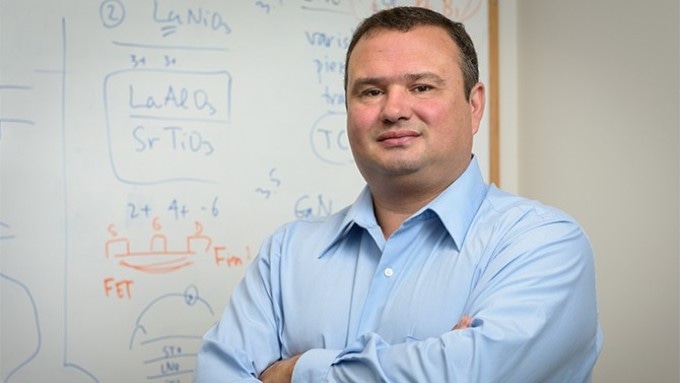Feb 1 2017
 The University of Delaware's Anderson Janotti has received the National Science Foundation's prestigious Faculty Early Career Award for research on defects and poltroons in complex materials. Credit: Evan Krape/University of Delaware
The University of Delaware's Anderson Janotti has received the National Science Foundation's prestigious Faculty Early Career Award for research on defects and poltroons in complex materials. Credit: Evan Krape/University of Delaware
Anderson Janotti, from the University of Delaware, won a National Science Foundation Faculty Early Career Development Award in order to develop computational models of defects in materials that are used for optoelectronics, electronics, and energy applications.
The five-year grant, “Defects and Polarons in Complex Materials,” was awarded via NSF’s Division of Materials Research.
Janotti, an assistant professor in the Department of Materials Science and Engineering, explained that the ability to monitor the number and type of defects present establishes whether a given material will be suitable for device applications, so understanding and controlling defects is vital for the development of materials.
However, defects can be detrimental to device performance, as seen in the case with those that limit the competence of solar cells. They can also be altered to enhance particular desirable characteristics.
For example, the electrical conductivity of semiconductors such as silicon and gallium arsenide can be drastically modified by adding minute concentrations of impurities, transforming a good insulator into an excellent conductor. This technology is widely exploited in the microchips that are found inside our computers, smart phones, and tablets.
Anderson Janotti, Assistant Professor, University of Delaware
Computer modeling can play a major role in this effort, as it is capable of complementing experiments on materials by providing access to properties and phenomena that are complicated to probe at the atomic scale.
Janotti, together with the support from the NSF, will use improved techniques of electronic structure theory and supercomputers in order to examine the role of defects in a series of complex materials that reveal a number of physical properties. The research may improve existing properties and could further result in discovering new ones capable of being used in novel device designs.
This grant will also be used to train high school students and graduates. Cutting-edge computational methods and improved concepts in materials theory will be studied by the graduate students. These students will also take part in an outreach program dealing with the teaching of scientific programing to high school students.
High school students will participate in summer internships and develop data-manipulation tools that will help the graduate students with complex data visualization.
Ultimately, we hope the work will identify defects that are detrimental to materials performance in devices and provide a basis to engineer defects, through doping or alloying, to enhance or broaden materials functionality.
Anderson Janotti, Assistant Professor, University of Delaware